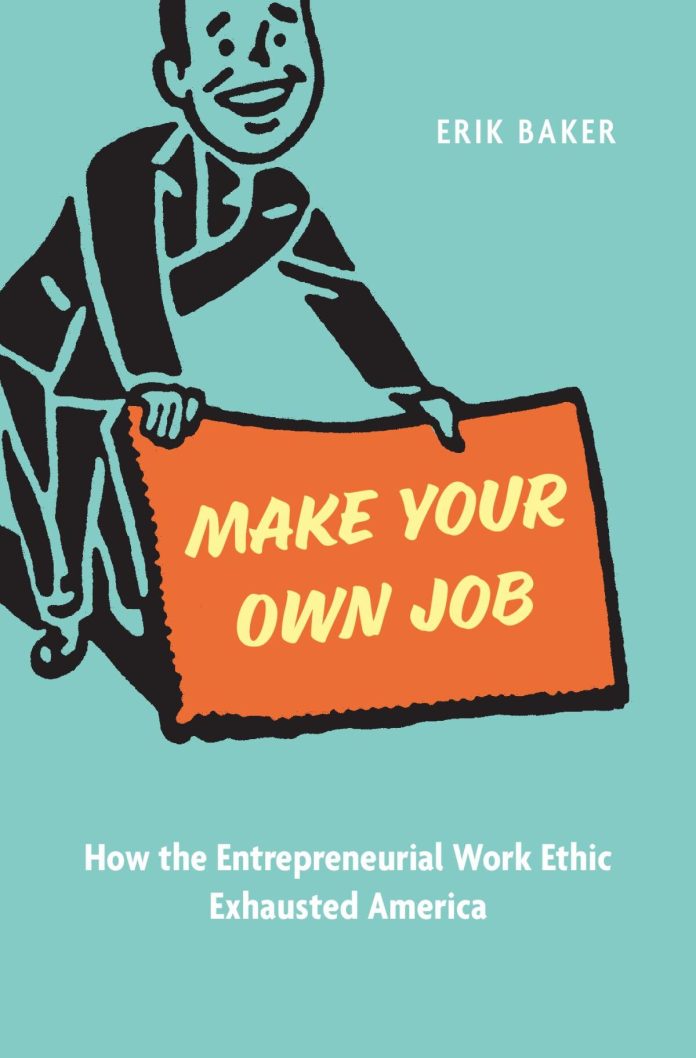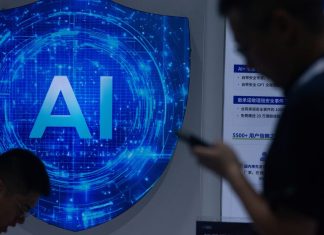Full disclosure: I didn’t read every word in this book, Make Your Own Job, and Scout’s honor, when reviewing a book, I (almost) always do — really. But in this case, for me, the type is too small, the paragraphs too long, the pages too many. Yet there is something important being said here about who we are, and who we must become, that you might want to look into for yourself.
Others sure think so.

A Washington Post reviewer warns that “this is a history with urgent stakes, and real consequences.” Other reviewers use words like “fascinating,” “brilliant,” “gripping.” The New Yorker avoids rendering a verdict, preferring to describe what the book does but not how well it does it. And, of course, it’s a New York Times bestseller.
An assessment that’s perhaps more informative comes from the author’s own clan. To Harvard Magazine, the book is “a thought-provoking, nuanced, well-written cultural, social, and intellectual history.” Library Journal concurs: “A solid, detailed intellectual history of how work ethic and entrepreneurship developed in the United States.”
Gripping ‘intellectual history?’
Can intellectual history really be “gripping?” To the author, absolutely. To the rest of us, this book makes the case that it darn well ought to be.
The name is Baker. Erik Baker. He’s a lecturer in the history of science at Harvard and, no surprise in this town, an Evanston Township High School grad, class of 2012. He’s also a nice guy, graciously crediting a now former ETHS teacher, Julie Mallory, “for her insistence on making me a better writer even when I didn’t want her to.” Guess what, Julie — it worked.

Make Your Own Job, (Harvard University Press, 2025) does sound like self-help, even echoing a true self-help bestseller, Make Your Bed. But its subtitle is not “Follow Your Passion, Find Your Fortune.” The actual subtitle reveals the book’s less promising, even worrisome, premise: “How the Entrepreneurial Work Ethic Exhausted America.”
Exhausted? Are our entrepreneurs exhausted? Are we? Geez. Let’s hope not. Unfortunately, Baker seems to be onto something. Even the rest of the world has noticed a problem threatening a basic component of our economic growth — our lock on innovation.
In a recent issue, The Economist lamented that “America is an example of what to avoid” in ensuring that certain kinds of innovative “global talent” have their shot at making the most of a country’s entrepreneurial environment. And consequences are likely.
“Without such a chance for themselves and their families,” the editors write, “the superstar bosses of four out of America’s ‘Magnificent Seven’ tech firms* would not be in their jobs today.” The magazine cites more expensive H-1B visa program fees as one reason for a possible innovation drought. Many non-U.S citizen scientists and technologists use the program to enter the U.S. for work. Another threat is “a vindictive crackdown on … elite universities [that] has jeopardized funding for research and the scope to take foreign students.”
As many books do these days, Make Your Own Job emerged from a doctoral dissertation, which is a good sign, because that usually means critical thinking applied to real research. As a dissertation, it no doubt cost the author a bundle in dedication. As a book, its 352 pages will cost you $35 new, less on the secondhand market and zero at the Evanston Public Library.
What’s in this book that’s so important?
Simply this: Though he doesn’t use these words, Baker makes a crucial — and considerable — contribution to understanding America, Inc.’s, “sustainable competitive advantage.” Translated from business-school speak, that’s a skill, talent, characteristic or flat-out gift that can propel an entity to the front of whatever pack it runs with — and keep it there. Something that, for the most part, cannot be copied or duplicated or re-created. And, to me, America’s sustainable competitive advantage is entrepreneurship or, more precisely, the entrepreneurial spirit. We have it in no small part because we’re a country, as The Economist notes, “built on immigration.”
Think about it. Our not-so-long-ago ancestors uprooted their lives, left their native lands, abandoned their families (or dragged them along) and travelled great distances in harsh conditions to set up shop as strangers in a strange land. Who does that?
Certainly not ordinary people. Certainly not ordinary when they build companies, industries and a country. They were in their bones entrepreneurs, and they were extraordinary. Today, I believe that’s who we still are. (Such nation-builders were our original immigrants. Stunner. Aren’t we lucky that they got in and didn’t get sent back to where they came from or somewhere they had never been?)
The entrepreneurial spirit got us to where we are. It’s something we must cherish, nurture and protect. Baker gives us the rationale and evidence to justify doing just that. “It’s an ideal of what our society values,” he told the RoundTable.
In fact, after chronicling the ups and downs of entrepreneurship in America (examples worth reading for yourself), Baker concludes that “twenty-first century American culture no longer takes entrepreneurship for granted. It is once more something precious, even miraculous; in need of lubrication and preservation.” Amen.
‘The gateway to a much bigger world‘
Baker’s family moved to Evanston from Cleveland when he was 8 years old.
“Evanston always felt like the gateway to a much bigger world,” he said. “It’s a self-reflective community and helped prepare me to think about society critically.”
Although Baker doesn’t point this out (at least I don’t think he does), not so long ago “entrepreneurship” was a dirty word to some in the business community. A business owner I once profiled asked me not to call him an entrepreneur because he didn’t like the connotation. Silly me, I thought it was a compliment.
But the word is tossed around a lot and left to land wherever. In a review of this book, The New Yorker, for some not entirely clear reason, felt obligated to share that “Luigi Mangione, the 26-year-old accused of murdering the CEO of United Healthcare,” has been described as “possessing an ‘entrepreneurial spirit.’” How so? In college he “resold Christmas lights.” In a word, no.
Uber drivers vs. Elon Musk
What about Uber drivers? Are they entrepreneurs? The issue, says Baker, is that kind of watering down can lead individuals to believe that “there is more of a level playing field than there is. If everyone is an entrepreneur, then it becomes hard to explain the difference in wealth and status [and] competitive success in the marketplace. It’s self-evident that there’s something fundamentally different between Elon Musk and an Uber driver.”
But that doesn’t seem to slow anyone down — nor does the speed with which new U.S. businesses fail: 25% in year one, another 25% in year five, topped off by another 10% by year 10, reports the Bureau of Labor Statistics.
Even so, some 49 million American adults, or 19%, are “actively engaged in starting or running a new business,” reports the Global Entrepreneurship Monitor. Two years ago, 5.5 million businesses were launched — a 56.7% increase over six years ago. Lost jobs or fear of lost jobs may be fueling the surge, Baker surmises.
In a previous life, I developed and facilitated peer-learning groups made up of presidents, CEOs and owners of so-called second-stage businesses — established, high-growth companies with gross annual revenues ranging from $3 million to $50 million plus. That experience led me to believe that entrepreneurs are mostly born, although they can be made if they hang around other entrepreneurs long enough, pay attention well enough and are determined enough.
We clearly have millions who are in the race, but probably few who understand just what it takes to win. Even though Make Your Own Job isn’t a how-to, maybe its deeply considered historical account of what winning — and losing — look like in America can help those hopefuls realize their own sustainable competitive advantages. And, if we’re lucky, inspire society to support their efforts and come along for more than the ride.
For those fundamental reasons alone, it might well be worth reading every word Baker offers, and, beyond that, taking those words to heart.
* Alphabet, Amazon, Apple, Broadcom, Meta, Microsoft and Nvidia, per Investopedia. Inclusion is based mainly on stock market performance but also impact on society at large. And, yes, the name comes from the 1960 movie about seven Old West gunslingers. Ironically, while successful entrepreneurs do take risks, they generally do everything possible to reduce those risks — they’re not gunslingers. The difference between them and the rest of us? They do make the leap.








